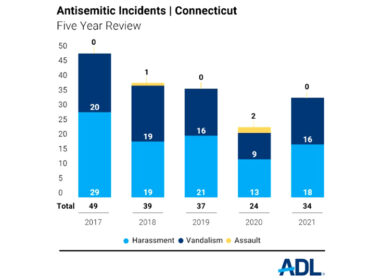
By Cindy Mindell
WEST HARTFORD – What does Judaism have to say about mental health? The question will be explored at Beth El Temple on Shabbat, May 14, when congregant Risa Sugarman tells her personal story of living with depression.
Sugarman grew up in Framingham, Mass., the youngest of three children, in a Jewishly-active family. She and her two older brothers attended Hebrew school and then Prozdor at Hebrew College, an after-school Hebrew high school. The family spent summers at Camp Yavneh in New Hampshire, where Sugarman’s mother worked in the office and her father oversaw and taught in the educational program.
“Being at camp truly solidified my identity as a Jew,” says Sugarman. Today, Sugarman and her husband and daughter are members of Beth El Temple in West Hartford, “where we feel we are part of a wonderful community,” she says. Their daughter is a kindergartner at Solomon Schechter Day School of Greater Hartford.
Sugarman began experiencing depression as an adolescent, and has struggled with varying degrees of the illness ever since. She earned a BA at Columbia University and a Master of Social Work at Fordham University. As a licensed clinical social worker (LCSW), Sugarman has worked in several different settings throughout her career, including a psychiatric day hospital for children and adolescents in Boston and a foster-care agency in New York City. She created curricula and provided training for mental-health clinicians through the University of Massachusetts Medical School.
Sugarman speaks and writes openly about her experiences in the mental health and medical communities. She is a contributing writer for Kveller and has also written for The Huffington Post, and the online resources Stigma Fighters, PsychCentral, The Mighty, and BringChange2Mind. She also writes her own blog, sillyillymama.blogspot.com.
“I don’t think I ever made a real conscious decision to write publicly about my depression,” she says. “I was already writing about my problems with fertility and I do remember thinking, ‘Why would I censor my writing now after being so open about my thoughts and feelings about infertility issues?’ It did not seem exposing or harmful to me. It helped me. I was able to write things that I could not verbally articulate.”
In the past two years, she has endured two back-to-back episodes of severe treatment-resistant depression. Hospitalized twice at Yale in the summer of 2014, she began electroconvulsive therapy (ECT), “which helped to save my life and provide relief,” she says. “Without pinpointing one specific treatment – as they all have worked together in terms of my recovery – the therapy and the ECT were huge contributors to being pulled out of the depression. I am very lucky that I have an amazing treatment team.”
When she was very ill, Sugarman was seeing her therapist for two back-to-back sessions on one day and for a single session on another day every week, as well as daily phone check-ins. Currently, Sugarman takes five medications daily, sees her therapist in Boston every other week, consults with her psychiatrist regarding her medications every couple of months, and attends a weekly Dialectical Behavioral Therapy (DBT) group.
Sugarman tells her story as a way “to combat the unnecessary stigma that is associated with mental illness, which comes in many forms,” she says. “Some are directed right at those with mental illness, while others are more abstract and come from others’ agendas. I have had people ask why I travel to Boston to see a therapist, who is a psychiatrist, when there are so many in the Hartford area. I explain that I have seen this therapist on and off for over 20 years and she is the best for me. I always think, if someone you love is ill, wouldn’t you do anything, travel anywhere, to find the best doctor to help? What seems logical to me is not to others as they view mental illness in a very different category than medical illness. They actually belong together. Our brains are what hold our illnesses and the biology is what contributes to mental illness. That sounds medical to me!”
Another manifestation of the mental-health stigma is financial.
“While insurance companies have come a long way in terms of reimbursement and coverage, my husband and I have had to use our savings, which is basically gone now, to pay for a lot of my treatment,” Sugarman says. “What I do not understand is that there are medical doctors on staff at insurance companies and they know and understand that any mental illness is a medical illness and, thus, it should be covered as such.
It’s called ‘parity.’”
Sugarman believes the best way to raise awareness about mental health is to talk about it.
“It’s about normalizing illness,” she says. “Just as people have diabetes, people also have bipolar disorder or depression. I like seeing people being brave and sharing their experiences on social media. Mental illness should not be a taboo subject any longer. It affects too many people and by stifling them in order to ‘keep quiet,’ society is only contributing to the shame, fear, and stigma that need to end.”
“Renewal of Spirit: Jewish Perspectives on Mental Health” with Rabbi Jim Rosen and Risa Sugarman, LCSW; Shabbat, May 14, 11 a.m. (following morning services), Beth El Temple, 2626 Albany Ave., West Hartford. For more information: bethelwesthartford.org / (860) 233-9696.








 Southern New England Jewish Ledger
Southern New England Jewish Ledger









